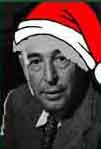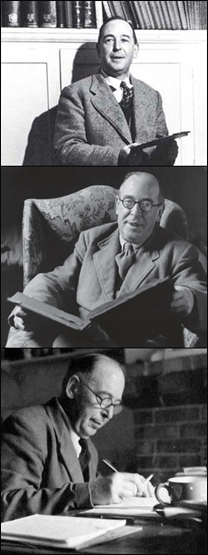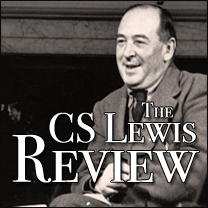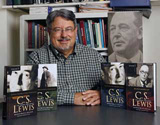
A Christmas Gift Guide for Those Who Love Jack
December 14th, 2008 | Skip to comments

 Wondering what gift to get that C. S. Lewis lover in your family or friendship circle? I lean always toward getting folks primary materials—that is, books by Jack rather than about him. But here’s a hardly unbiased top ten list of C. S. Lewis gift items—and, through the magic of internet shopping, there’s still time to get them! (All items below, save one, are linked to Amazon but they are also available from many other providers.)
Wondering what gift to get that C. S. Lewis lover in your family or friendship circle? I lean always toward getting folks primary materials—that is, books by Jack rather than about him. But here’s a hardly unbiased top ten list of C. S. Lewis gift items—and, through the magic of internet shopping, there’s still time to get them! (All items below, save one, are linked to Amazon but they are also available from many other providers.)
- Yours, Jack. C. S. Lewis ($17.49; HarperCollins, 2008). My favorite book of the year—a great compendium of those letters of Jack in which he served his correspondents as counselor, pastor, teacher, and friend. This great editorial achievement by Paul Ford, the great Narnian encyclopediast, built upon the work of Lewis’s estimable bibliographer, Walter Hooper, is a manageable but engrossing volume that will introduce you to the amiable, approachable, indefatigiably orthodox and compassionate Lewis.
- The Personal Heresy. C. S. Lewis. Edited by Joel Heck. ($19.99; Concordia University Press, 2008). This splendid book by Lewis has been out of print, really, since 1939—though it did show up as a reprint in the mid-1960s. Editor Heck has done a superb job in this new paperback in annotating and explaining the original technical literary terms and allusions for contemporary readers and providing a much needed index. I can almost guarantee your friend or family member does not have a copy of this! What’s it about? In some sense, it’s about everything, but in point of fact, it is a debate between Lewis and a prominent literary scholar of the time, E. M. W. Tillyard, as they spar over the place of objectivity in understanding literature, but it is really a stage on which Lewis can perform some great soliloquies about what it means to possess a stable, healthy, inquisitive mind and not fall into the errors of subjectivism. If you want to know what it would have been like to be in an Oxford lecture hall listening to Lewis, here it is.(Personal disclosure: I wrote the Introduction to this work.)
- Smoke on the Mountain. Joy Davidman ($17.95; WJK Press, 1985). This book, published in 1955 by Joy Davidman, C. S. Lewis’s late-in-life marriage partner, provides terrific insight into her mind and heart as she provides a commentary on the ten commandments. It is a tour de force in some ways, but it is helpful to those who want to understand more about the relationship she and Lewis had, and why he would have found her a formidable theological mind to reckon with. Lewis himself provides the preface to this work, and he can’t help but pique one’s curiosity with these words: “I do not of course agree with Miss Davidman at every point. In such a book every reader will have his own crow to pluck with the author. For my own part, what I would most gladly see altered are certain passages where she quotes myself for thoughts which she needed no sense save her own to reach and no pen save her own to express. But every old tutor (and I was not even that to Miss Davidman) knows that those pupils who needed our assistance least are generally also those who acknowledge it most largely.”
- Till We Have Faces. C. S. Lewis ($10.71; Harcourt, 1957). Considered by Lewis his masterpiece, it is likely his least read work of fiction, and in genre unlike anything else he wrote. This is so even though he had been trying to write this book virtually his whole life. Subtitled as “a myth retold,” Lewis undertakes the challenge of evoking a dark, brooding pagan world and what it means to take the journey from unbelief to belief, all playing out in the heart, mind, and soul of female protagonist, Orual, the Queen of Glome. Many readers have given up too soon in fathoming this book, but it repays many readings to get the purpose and meaning of the work whose main character must learn to “die before she dies.” It is the sort of work Lewis himself loved to read, and one that the reader–the reader whom Lewis wants as his reader–best enters without too many signals or maps, for this journey is best taken alone. And then discussed and reflected upon in tranquility.
- An Experiment in Criticism. C. S. Lewis ($13.95. Cambridge University Press). This delightful little book is Lewis’s last work of literary criticism, but don’t let the title discourage you: it is about how and why to read. I sometimes tell friends, it’s a kind of “theology of reading,” but, at the very least it’s a “rhetoric of reading”; you will come away knowing a lot more about history, literature, ethics, myth–and yourself. Not exactly a “how to” manual in the modern sense, Lewis explains the premises for a kind of approach to a text that allows it to speak through its time to ours while respecting the original context without erasing the reader in the present. It has one of the greatest crescendos for a book of this kind ever written. But who am I kidding? There has never been a book “of this kind” before. Lewis takes you by the hand and gives you a great tutorial in why reading matters, and how to make it matter in your life.
- The Company They Keep. Diana Glyer ($19.80; pb. Kent State University Press, 2007). A towering, magnificent work on the Inklings that peers behind the curtain of Lewis and Tolkien’s personal and writing relationships—and offers the most responsibly fact-based, inspiring biographical treatment yet of their amazing friendship and continuing impact on all sorts of audiences. Diana’s work is a model for anyone who aspires to be a chronicler of any kind. To quote myself from the back cover of the hardback: “The Company They Keep is an astonishingly thorough work, lucidly and boldly illuminating the collaborative writing processes of C. S. Lewis and J. R. R. Tolkien and their colleagues during the most fruitful period of their careers. Diana Glyer’s impressive achievement immediately supersedes in scope and authority all previous treatments of the Inklings in extant biographies and encyclopedia.”
- Planet Narnia. Michael Ward ($23.96; Oxford, 2008). This is the past year’s most category-defying, argument-starting volume on Lewis’s Narniad, soon to be a BBC documentary under the title, “The Narnia Code.” Best fits someone with a mature knowledge of the tales and an appreciation for Lewis’s affection for the medieval worldview–and doesn’t mind being challenged by Ward’s own unconventional, thoroughgoing astrological take on the provenance of Lewis’s wonderland. Most readers seem to split right down the middle on its cogency and relevance—but you will never read a volume more committed to looking through the eyes of an author (Lewis) whose prodigious knowledge precludes ruling anything out as an interpretive scheme. Ward’s prose sparkles, especially as he recounts his scholarly detective adventure. Don’t wait for the movie!
- Brooke Fraser, “C. S. Lewis Song” ($0.99; Amazon download). This treasure of a song comes from New Zealand Christian artist, Brooke Fraser’s album, Albertine, whose lyrics draw upon Lewis’s famous phrasing, “If I find in myself a desire which no experience in this world can satisfy, the most probable explanation is that I was made for another world.” A graceful performance produces a grateful heart. The whole album is worth attending to.
- Through the Shadowlands ($17.99; Vision Video, 2004). This is the vastly superior 1985 BBC version of Shadowlands, starring Joss Ackland and Claire Bloom, that towers above the Richard Attenborough version starring Anthony Hopkins in authenticity and impact. Originally broadcast on PBS in the U.S., this DVD set contains both the 90 minute and abridged 78 minute version (first released to church audiences in the 90s). This screenplay captures much more of Lewis’s Christian testimony and its centrality to his romance to Joy Davidman.
- C. S. Lewis: Life, Works, Legacy (4 vol., $240; Praeger Press, 2007). Caveat lector–I edited this 4 volume set and wrote several of its essays. Consider therefore the source of this recommendation. And, yep, you’ve got to really love Lewis and the person you’re buying it for to shell out this kind of dough, I realize. But it’s 20% discounted on Amazon, and I must say that its roster of contributors comprises the who’s who of major international Lewis scholars writing in their prime on the topics you’ve always wanted in-depth coverage of. Why venture out into the night to your library in the bleak midwinter when you can have this fine quartet of volumes right on your shelf? Don’t take my word for it; here’s the Library Journal review: “All in all, this is the most thorough and current collection available of analysis and opinion on Lewis. A suitable companion to the authoritative The C.S. Lewis Readers’ Encyclopedia , it is recommended for academic and large public libraries.” –Paul D’Alessandro.




[…] added to Bruce Edwards’ C.S. Lewis-themed blog is “A Christmas Gift Guide for Those Who Love Jack.” On his list of 10 items is the […]
Pingback by File 770 » Blog Archive » Ask Father Christmas for This — 15 December 2008 @ 1:52 AM